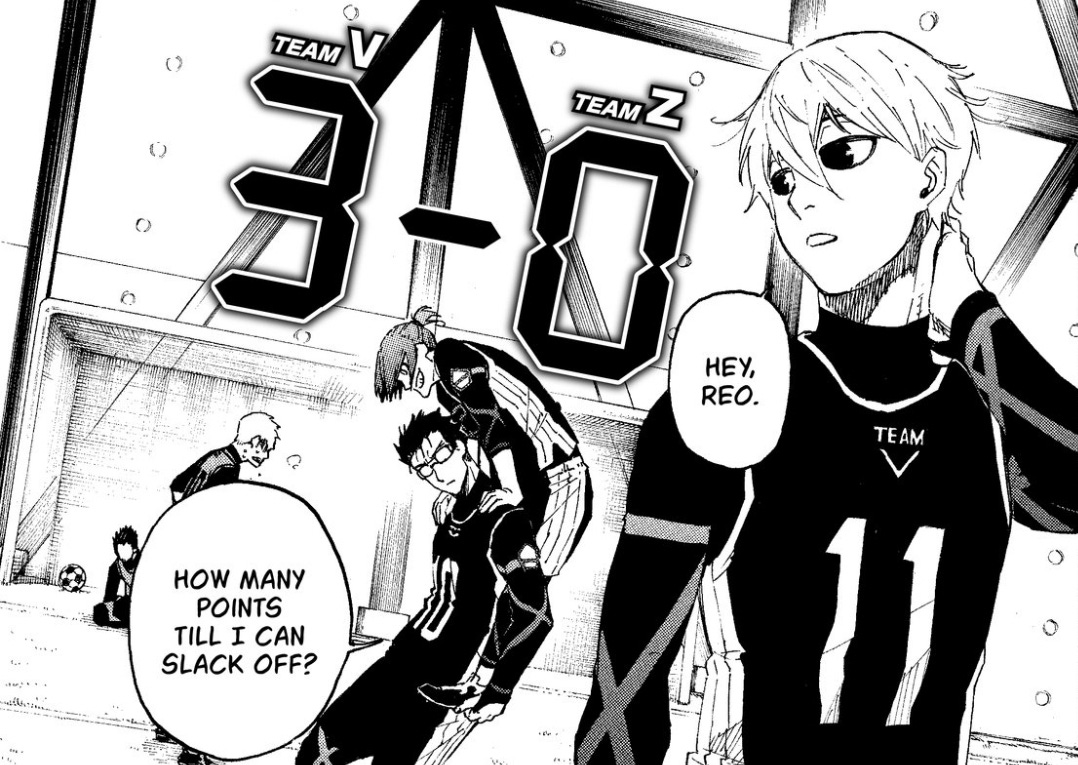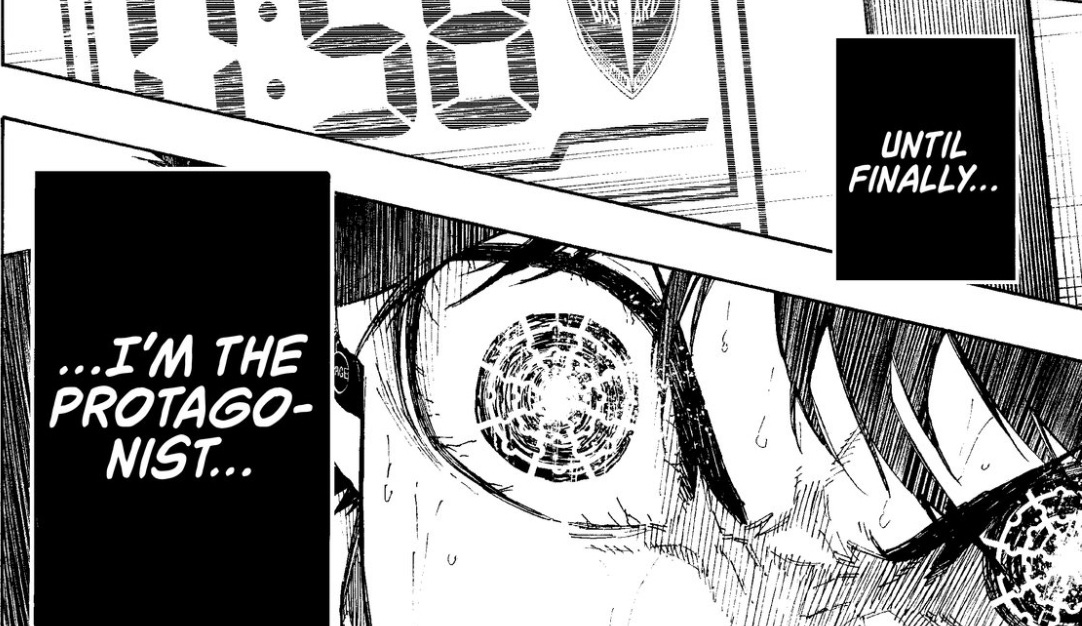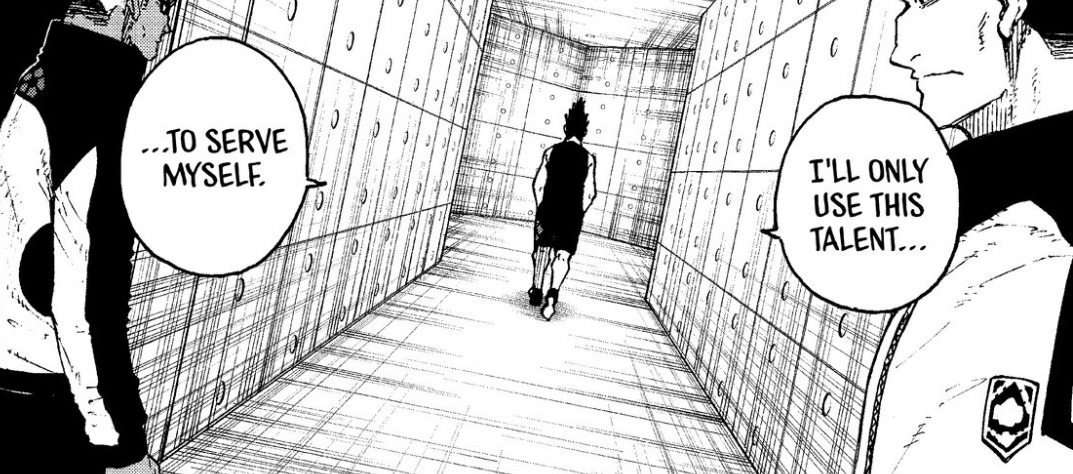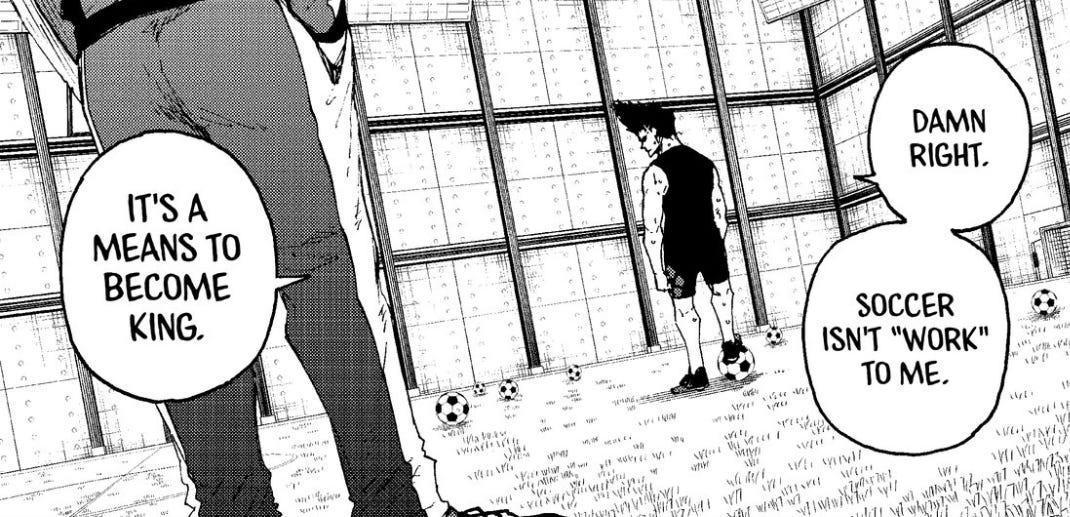Preface!
You may have noticed I didn’t post this Tuesday. Or maybe you didn’t notice, I don’t know. It’s my first time missing my own schedule at MangaCraft. Not gonna lie, I haven’t been reading a ton of manga lately. Not because I don’t want to, but because time has been elusive.
So when the time came to get back on course, I could only turn to one series. The series I always fall back on, because every little aspect of it can be obsessed over, and I’m in the business of obsessing over little aspects.
I know I always say this, but seriously—every time I open Blue Lock, there’s something new to freak out over. And this time, it was where I least expected. It was a character I had written off entirely.
Preface over.
There are certain movie scenes/quotes that live in my head, which I will call upon in even the most tangential situation. One such scene is from the movie Airplane!, when the control tower suggests using spotlights to guide the plane. It makes sense, but Kramer says his famous line, “No, that’s just what they’ll be expecting us to do.”
It’s ridiculous, but hilarious. And now, every time something smart and/or obvious is presented to me, there’s at least a 75% chance I will say those same words.
Expectations are fun to play with, whether for humor or for intrigue. Readers bring their expectations to characters and situations, and creators can play into those expectations or reverse them entirely. Or both. Or they can do neither and explode the expectations without remorse, laughing at the chaos they’ve created.
How does this relate to Blue Lock? Glad you asked.
Before we get into Blue Lock, here’s what you need to know.
A whole bunch of high school soccer stars in Japan are brought into an experimental system—Blue Lock. The goal: create the best striker in the world. All this teenage testosterone in one facility, competing for a singular spot. This leads to butting of heads, meaningful friendships, rivalries, and so much more. And given the simplicity of the plot, it allows so much room for characters to develop alongside each other.
That’s really all you need to know.
I’ve made it clear from my earliest scribblings about Blue Lock that there is one character in this series I really didn’t like. And that character is Nagi. Or as my wife calls him, NAGIIIIII!!!
He’s a trope. A slacker. A “what a drag” character who literally uttered that line at least once a chapter. For a series that did such a great job building complex characters, I didn’t understand where Nagi fit in, let alone how he got his own spin-off series. Where’s my Barou spin-off?
But the more time Nagi got, the more I saw what was going on here. And this whole time, it wasn’t just Nagi.
Aside from Nagi, I’m also going to obsess over Isagi and Barou to make my point.
Each of these three characters begins as a trope. Nagi is the lazy guy. Isagi is the dark horse hero. Barou is a villain with a redemption arc.
But each one of them grows out of those expectations in different ways, without ever leaving behind the trope entirely.
Let’s start with Isagi. As the dark horse hero, the lowest rated player of all the assembled players, the one least likely to succeed, he’s immediately a default guy to root for. He has the backstory, the kind heart, he’s a good guy, through and through. The expectation is that he will rise to achieve his goal, perhaps reshaping the goal and its expectations along the way.
But while there are aspects of that, Isagi is not on a yellow brick road to stardom. In fact, thus far into the series, it’s not even really clear if that objective is still on the table. What is clear is that Isagi will have to get a little more, dare I say evil to achieve his goal. Well, not evil, I was being dramatic. But selfish. Egotistical. That’s the expectation in order to succeed in Blue Lock. And yet, wouldn’t that in-turn mar the dark horse hero trope Isagi began as?
One might say so. And by one, I mean me.
Then there’s Barou, the single-minded villain determined to be King. He begins his arc of redemption when we see a different side of him—he’s a bowling aficionado and a clean freak. Now he has layers that can introduce some cracks into his evil foundation. Well, not evil, I’m still being dramatic. But bad. Egotistical. Selfish. Surely he has to shed those negative traits as he grows along his redemption arc, right?
Nope.
In fact, Barou retains all of his seemingly “negative” traits throughout the story. He doesn’t want to be King any less. And that redemption arc has become little more than a rivalry between Isagi and Barou, but I wouldn’t call it a friendly rivalry.
The trope we thought Barou was going to become, he didn’t. In fact, the things he would normally leave behind are still his dominant traits.
Lastly, there’s Nagi. A gamer, a slacker, a “what a drag”-er. This is a character who retained his trope the longest, but unlike Barou, as he grows, he doesn’t really retain any of that laziness. Maybe there’s still room for him to be naturally messy or feel the occasional craving to play video games, but it’s been volumes since Nagi complained about work or effort. He is fully invested in his quest to be the best. So much so that he even ditched his best friend, Reo, to continue on that quest. Reo, who kept Nagi propped up in soccer when Nagi wanted nothing to do with it.
Nagi literally cut all that away. He exploded his own trope to become something more.
Three characters, all beginning as tropes, and all growing out of them in different and compelling ways. Barou never left his villainy behind. Effortless Nagi put so much, well, effort, into his new passion that it completely changed his life. And the dark horse hero Isagi’s path to heroism is an open world objective.
It’s usually about now that I try (and perhaps fail, I’m not proud) to relate what I’m writing to a mainstream example, like Lord of the Rings. So let’s pick the lowest hanging fruit—Legolas and Gimli. They are each a trope. Gimli, the stubborn dwarf who hates elves. Legolas, the suave and unnaturally coordinated elf who hates dwarves.
They explode the biggest piece of their shared tropes by becoming best friends. It’s so satisfying because it’s not the expectation.
Isagi, Nagi and Barou exceed expectations. But even when they do that, they also don’t. Isagi is still the dark horse hero, even if that entire notion is complicated. Barou is still a selfish jerk by most counts, almost like his redemption arc never materialized. And Nagi is so far from his original expectations that it’s hard to even recognize him anymore (in a good way).
These are all characters that could have been left at “good enough” in the series. Let Isagi rise to the top. Let Nagi reluctantly succeed. Let Barou become a good guy. But Blue Lock didn’t settle at good enough. They took these tropes—and others I didn’t cover here, like Rin doubling down as an egomaniac—and exploded them to defy expectations while creating new and exciting ones.
If character is king in storytelling, then Blue Lock is the king of all things. And Barou is King of Blue Lock, so…







Hmmmmm…. Nagi still did wrong in my book. But you had a compelling point!!